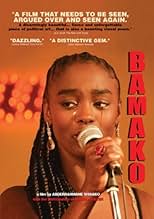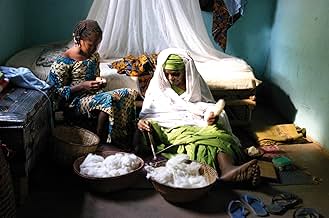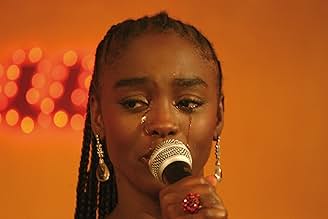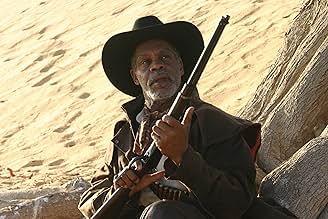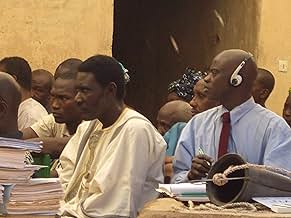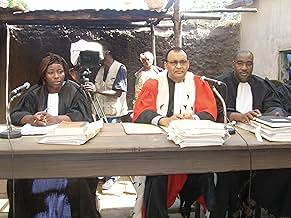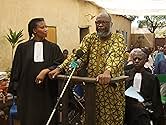Bamako
- 2006
- 1h 55min
Agrega una trama en tu idiomaBamako. Melé is a bar singer, her husband Chaka is out of work and the couple is on the verge of breaking up... In the courtyard of the house they share with other families, a trial court ha... Leer todoBamako. Melé is a bar singer, her husband Chaka is out of work and the couple is on the verge of breaking up... In the courtyard of the house they share with other families, a trial court has been set up. African civil society spokesmen have taken proceedings against the World Ba... Leer todoBamako. Melé is a bar singer, her husband Chaka is out of work and the couple is on the verge of breaking up... In the courtyard of the house they share with other families, a trial court has been set up. African civil society spokesmen have taken proceedings against the World Bank and the IMF whom they blame for Africa's woes... Amidst the pleas and the testimonies, ... Leer todo
- Dirección
- Guionista
- Elenco
- Premios
- 4 premios ganados y 2 nominaciones en total
- Saramba
- (as Hélène Diarra)
- Avocat de la défense
- (as Mamadou Konaté)
- Le procureur
- (as Magma Gabriel Konaté)
- Cow-boy
- (as Dramane Sissako)
- Dirección
- Guionista
- Todo el elenco y el equipo
- Producción, taquilla y más en IMDbPro
Opiniones destacadas
It was rewarding to hear the testimonies of the citizens transcend the illiterate stereotype of Africans. Though the majority of them use powerful rhetoric to emphasize and provide solutions to the problems their country faces, there were two testimonies in particular that really stood out as powerful demonstrations of their impoverishment. The man who is silent and the man who sings; both convey a unique message that represents the same underlying themesocial plagues.
The man who gives a silent testimony is a type of the many who suffer with neglected education. His weary eyes, depressed lips and resonating silence speak louder than any eloquent words could do; as if his body language cries, "I am the consequence of social malnourishment. Please give me the opportunity to be nourished like others." The man who sings in an unknown tongue provides commentary on a sort of meta-political-level. Let me explain what I mean by this.
The entire film is very verbose; it is not aesthetically pleasing for the eye as it is more so just a lot of spoken words for the ear. It requires a lot of mental exertion and contemporary socio-economic knowledge to really understand what these people are talking about. With all of this heavy, didactic conversation and exchange of intonated words, the issues talked about would seem completely arbitrary to someone who was not educated. In fact, the conversation would seem alienlike a jumbling mess of chaotic noises and sounds. The man who sings his testimony also appears alien to those who listen. He is merely personifying the chaos of political jargon he hears through an artistic expression of music. He, too, is plagued by a lack of education; his song enters his listener's hearts on a level that is both metaphysical and political.
Overall, the citizens of Mali hide no pretense from where their problems arise, but link much of their pauperization to corporate corruption in the West. Western ideals and social reforms that are inevitably forced upon their economy make Malians rightfully jaded towards the World Bank, WTO, G8 and other Western influences. The richer countries around the world feed like parasites upon the African economy, pushing them deep into debt, refusing to give financial aid until they conform to the Western ideal of privatization, and ultimately drowning them in a sea of tyranny.
I think the filmmakers choose to shoot this film like a documentary because it adds an objective lens to the reality of what these people actually suffer from. These issues are not fabricated to glamorize some type of Hollywood agenda, but are real-life situations involving real-life people, and they deserve the respect to be listened to in a real court of law. Sadly, however, they are not privileged with such a luxury. With filmmakers who care about their situation, they are able to fabricate the form of a courthouse, yet the content that is exchanged inside is painfully true.
The film intercuts several narrative sketches throughout the mock trial, giving examples of the types of lives the Malians live. One story focuses on the tension created between a father's temptation to leave his wife and child in order to pursue financial stability elsewhere, while another focuses on the overall idle state of the citizens who hopelessly sit around listening to politics through a speaker. The sense of despair in both stories comes in direct consequence of Africa's relationship to the corrupting West. The reason why Africa hurts as much as she does is because of the neglect and maltreatment that larger, dominating countries have subjected her to.
One particular scene that demonstrates Africa's ill-feelings towards the West is shown through the film, Death at Timbuktu. The film shows cowboys come into a foreign town and essentially rape, murder and pillage the people of their goods. Why?because they have the power to do so. This film seemed to suggest the brutality of Western Capitalism. How large, domineering and privatized corporations come into small, submissive and frail countries like Africa and essentially do exactly what the cowboys in the film didexploit and corrupt.
Both filmsBamako and the film inside Bamako, Death at Timbuktuseem to have a slight sense of propaganda behind them in order to awaken the injustices done to Africans, and call for equal treatment, opportunity and overall justice.
This movie is an alert that things are going too far in Africa in general and in Mali in particular.
Intelligently done with many links and references to the international behavior in front of money and poverty. The glance through the cowboy movie or the interaction of the 'neighborhood' with the court to echo the speeches and how people believe in the 'trial'.
I do recommend this movie to give a chance to African film makers to raise their voice in front of the "collecting_money_at_all_costs" machine that became IMF or the World Bank
There is a whole panoply of characters a beautiful queen bee (an example of the grace and poise of African women), Melé (Aissa Maiga) and her husband Chaka (Tiecoura Traore). Melé's a popular singer whose marriage is disintegrating and two of her spirited songs are integrated into the film. People watch TV, and the director ironically injects into his film a "western" set in Timbukto, in which incongruous white men as well as Palestinian director Elia Suleiman and Bamako's producer Danny Glover shoot each other. The effect is grotesque, but that's the point: why should Africans be watching TV westerns? Elsewhere on the earthy "set" of the film there's a young man, also beautiful, who lies dying inside a nearby building with no medical care. There are many children, some playing about, some being breast-fed. A couple marry, and the festivities interrupt the trial. There's a flinty gatekeeper who decides who can come in and who can't. There's a traditional griot who's one of the "witnesses" and who ends the proceedings with a hypnotic chant (not translated, but strangely stirring and stunning). There's another "witness" a former schoolteacher so hopelessly demoralized he refuses to utter a word; a sound recordist; a video photographer who says he prefers to take pictures of the dead because they're more real; and many authentic-looking extras, including a variety of dried-up tough young-old (or ageless) stick-men, all of them coming and going.
You get a vivid sense from all this, which is rhythmically inter-cut with the trial itself, of the harmonious seeming chaos of African village life; the color, the beauty and dignity of the people. You get above all a sense that life goes on. There are two white men on the "stage" of the trial, one an advocate for the international organizations (Roland Rappoport) and the other (William Bourdon) eloquently speaking for the African people and for socialism who concludes that the first world should be sentenced "to community service" "forever." Eloquent though he is, a Malian woman lawyer who speaks after him (Aissata Tall Sall) is more touching.
Like An Inconvenient Truth, Bamako's trial presents facts and arguments of enormous present day importance this time surrounding not global warming and the disintegration of the earth's eco-system, but another set of the planet's major problems: the social imbalances, the domination of the many by the few; poverty and disease, "terrorism" used to excuse world domination, the richest nations' doing harm while seeming to do good; the ravages of globalization, the privatization of natural resources down to land and water, perhaps ultimately to air; the national debts of poor nations collected by the economic organizations of the rich ones, and thereby preventing the poor ones from gaining any ground against the ravages of poverty and underdevelopment. .
This is powerful stuff. Sisako is, in theory, presenting both sides of the story, though it is obviously which side he is on and which side is in the majority on screen. This is polemic. The international organizations obviously aren't overtly setting out to destroy Africa are they? It is preaching; but it is done in a rich and colorful and dramatically moving way. The film picked up a US distributor during the New York Film Festival. It's not clear whether the way the print was presented was accurate. This seemed to be a projection of a digital copy that lost the surface beauty of the original. The colors of Jacques Besse's photography were beautiful, but dimmed. In French and Bambara (the Malian language).
Through a story that revolves around a court case, we see the stories of struggle of a wide range of people: mother, educator, escapee, unemployed person, and the average guy trying to make ends meet but having a difficult time.
For me, it clarified some of the issues and effects of fairly extreme poverty and lack of government prioritization for social services, health and education. It made the argument that a government may be at fault for selling out the country's future at the expense of developing a stronger base.
The bleakness, however does something bigger, or I hope it does -- I hope it gives strength to continue to fight as the producers, I think, would like.
See this. Africa is an important piece of the world and an important piece of the globalization of the world.
¿Sabías que…?
- ErroresDuring the inset "Death in Timbuktu" "western," just before the first gunshot, a car can be seen moving between two buildings in the background. This, however, could be interpreted as intentional by the director, who was parodying non-Western interpretations of a "western" (other countries who partake in a love of westerns are Thailand and Cambodia). The child in this scene is also wearing a Nike shirt. The effect is to present the sort of low-budget, pulp film one might see in a television broadcast in Mali, while supplying a metaphor to the actual movie's plot.
- Citas
Avocat partie civile: We cannot throw Paul Wolfowitz into the Niger. The caimans wouldn't want him.
Selecciones populares
- How long is Bamako?Con tecnología de Alexa
Detalles
- Fecha de lanzamiento
- Países de origen
- Idiomas
- También se conoce como
- Bamako: el grito de lucha de un continente
- Locaciones de filmación
- Productoras
- Ver más créditos de la compañía en IMDbPro
Taquilla
- Presupuesto
- EUR 2,000,000 (estimado)
- Total en EE. UU. y Canadá
- USD 112,351
- Fin de semana de estreno en EE. UU. y Canadá
- USD 10,183
- 18 feb 2007
- Total a nivel mundial
- USD 1,059,232
- Tiempo de ejecución1 hora 55 minutos
- Color
- Mezcla de sonido
- Relación de aspecto
- 1.85 : 1

